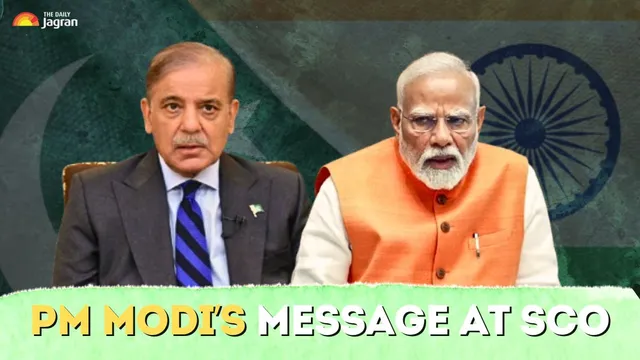- By Supratik Das
- Mon, 01 Sep 2025 01:08 PM (IST)
- Source:JND
Prime Minister Narendra Modi on Sunday used the stage of the Shanghai Cooperation Organisation (SCO) summit in Tianjin to deliver a strong message on terrorism, directly linking the recent terror attack in Pahalgam to decades of cross-border militancy that India has endured. Without naming Pakistan, the Prime Minister said that “open support of terrorism by some countries cannot be acceptable to us,” urging member states to adopt a unanimous and uncompromising stance against extremism.
On Terrorism And Cross-Border Threats
Addressing the plenary session of the SCO Council of Heads of State, Prime Minister Modi said terrorism is not only a national security concern but also a collective threat to humanity. “Security, peace, and stability are the basis of the development of any country. But terrorism, separatism, and extremism are big challenges in this path. Terrorism is not just a challenge to the security of a country but a common challenge for all of humanity. No country, no society, no citizen can consider itself safe from it,” he said, stressing that “no double standards are acceptable on terrorism.”
#WATCH | At the Shanghai Cooperation Council (SCO) Members Session in Tianjin, China, Prime Minister Narendra Modi says, "India has been bearing the brunt of the terrorism for the last four decades. Recently, we saw the worst side of terrorism in Pahalgam. I express my gratitude… pic.twitter.com/TU3cAf1ibc
— ANI (@ANI) September 1, 2025
He noted that India has consistently pushed for global action against terror financing and radical networks. “India took the initiative to fight Al Qaeda and terrorist organisations associated with it by leading the Joint Information Operation. We raised our voice against terror financing. I express gratitude for your support in it,” the Prime Minister added.
Making a reference to the recent terror attack in Jammu and Kashmir’s Pahalgam, which claimed the lives of security personnel and civilians, Modi said the incident reflected the “worst face of terrorism.” “India has been bearing the brunt of terrorism for the last four decades. Recently, we saw the worst side of terrorism in Pahalgam. This attack was an open challenge to every country and person who believes in humanity. In such a situation, it is natural to raise the question of whether the open support of terrorism by some countries can be acceptable to us,” he remarked. The Prime Minister thanked the “friendly countries” that expressed solidarity with India during its hour of grief.
#WATCH | "We have to say clearly and unanimously that no double standards are acceptable on terrorism..." says Prime Minister Narendra Modi at the Shanghai Cooperation Council (SCO) Members Session in Tianjin, China
— ANI (@ANI) September 1, 2025
PM Modi says, "... This attack was an open challenge to every… https://t.co/n9LlMc91Kq pic.twitter.com/UtlvwlHo5B
On Connectivity And Sovereignty
Turning to regional connectivity, the Prime Minister underscored India’s consistent position that connectivity projects must respect the sovereignty and territorial integrity of all nations. “Connectivity that bypasses sovereignty loses trust and meaning,” he said, in a remark widely seen as a veiled reference to projects like the China-Pakistan Economic Corridor. He highlighted India’s work on strategic initiatives such as the Chabahar Port and the International North-South Transport Corridor, arguing that these would strengthen trade routes and deepen engagement with Central Asia and Afghanistan.
On Development and India’s Growth Model
Modi used the SCO platform to project India as a partner in global growth. He said India’s governance approach is built on the mantra of “Reform, Perform and Transform,” and the country has consistently sought to convert challenges into opportunities. Inviting SCO nations to participate in India’s development journey, he said, “Today, India is moving ahead with confidence. I invite all of you to be part of India’s growth story.”
On SCO’s Reform Agenda
Acknowledging the evolution of the Shanghai Cooperation Organisation, Modi welcomed the establishment of new centres within the grouping to deal with emerging threats such as organised crime, drug trafficking, and cyber security. “It is a matter of happiness that the SCO is evolving with the changing needs of the times. We welcome this reform-oriented mindset,” he said, signalling India’s support for strengthening the institution’s capacity to address non-traditional security challenges.
Apart from the main session, Modi’s engagements with world leaders drew attention. Meeting Chinese President Xi Jinping for the first time since the 2020 border clashes, Modi said relations had “moved in a meaningful direction” after disengagement along the Line of Actual Control, while Xi expressed hope for “stable and healthy development” in ties. Modi is also set to hold talks with Russian President Vladimir Putin as New Delhi navigates American tariffs on Indian exports linked to its energy imports from Moscow. In another key meeting, he assured Maldives President Mohamed Muizzu that India’s development cooperation would continue to serve the interests of both nations. The Prime Minister also congratulated Uzbekistan on its Independence Day and thanked China for hosting the summit. Stressing that the SCO must evolve with global realities, he urged member states to “stand united against threats while promoting cooperation in trade, technology and development.” His remarks come at a time when the grouping, which includes Russia, China, India, Pakistan, and several Central Asian republics, is navigating geopolitical rifts and new security challenges.
With inputs from agency.
